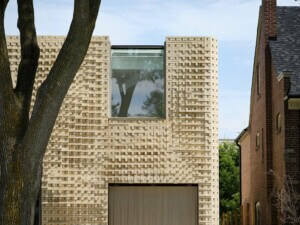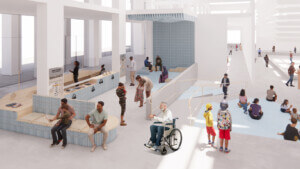This article is part of our series of profiles on The Architectural League of New York’s 2024 Emerging Voices winners published in the March/April issue of AN. The full list of winners can be found here.
David T. Fortin is a tenured professor of architecture at the University of Waterloo in Cambridge, Ontario, and the founder of David T. Fortin Architect (DTFA), an Indigenous-owned office working across Canada. He has represented Canada twice at the Venice Architecture Biennale—curating 2023’s Not for Sale, organized by Architects Against Housing Alienation, of which Fortin is an organizing committee member, and 2018’s UNCEDED: Voices of the Land.
DTFA works directly with Metis, First Nations, and Cree communities, incorporating vernacular building practices through a design process based on listening and local engagement. Like many other Indigenous practitioners, Fortin is often put in the position of representing disparate groups at the bequest of an institution. Fortin told AN: “When you’re working with a specific Indigenous community, inspiration for your design work is much clearer. There is a specificity to what you want to express.” His role can be especially valuable on larger institutional projects, which require negotiation among multiple voices and cultures that are just now getting a seat at the table.
Recently, DTFA has completed Horse Dance Lodge, an Indigenous transitional housing project, as well as three projects in Saskatoon, Saskatchewan for the Metis community: two office buildings for the Gabriel Dumont Institute and Ma Faamii Family and Social Services, as well as Round Prairie Elders’ Lodge, a modular housing project. The office is also at work on two proposed multifamily housing complexes in Kamloops, British Columbia, and Regina, Saskatchewan.
Fortin’s design ethos is also reflected in his pedagogy. He leads a design studio where students are tasked with reimagining Canadian embassies in the era of reconciliation, which prioritizes recognition of local Indigenous culture instead of the colony. Fortin reminds us that “the emphasis for all Indigenous people is always ‘Whose land are you on?’ and how to respect them as a host.”











